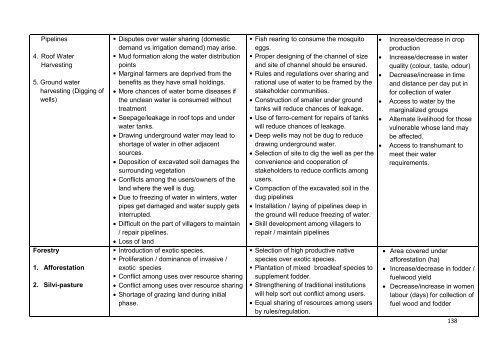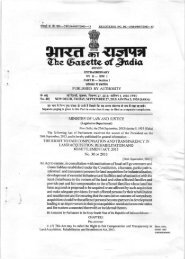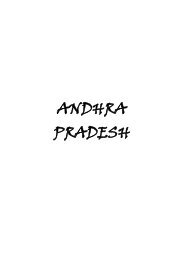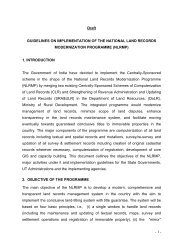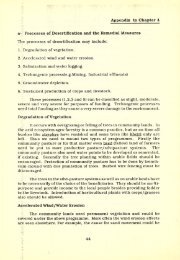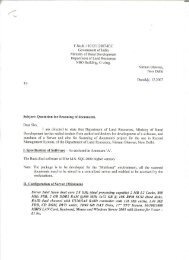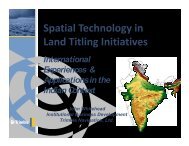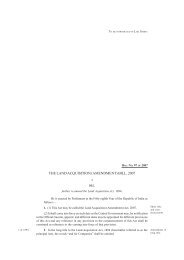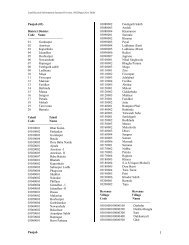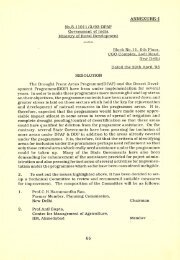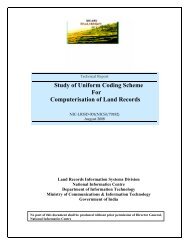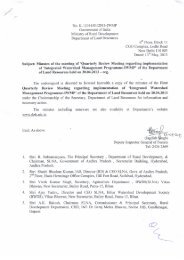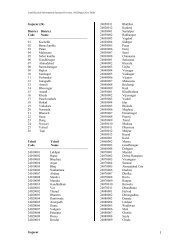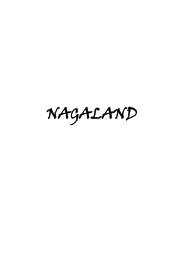Uttarakhand - Department of Land Resources
Uttarakhand - Department of Land Resources
Uttarakhand - Department of Land Resources
Create successful ePaper yourself
Turn your PDF publications into a flip-book with our unique Google optimized e-Paper software.
Pipelines<br />
4. Ro<strong>of</strong> Water<br />
Harvesting<br />
5. Ground water<br />
harvesting (Digging <strong>of</strong><br />
wells)<br />
Forestry<br />
1. Afforestation<br />
2. Silvi-pasture<br />
• Disputes over water sharing (domestic<br />
demand vs irrigation demand) may arise.<br />
• Mud formation along the water distribution<br />
points<br />
• Marginal farmers are deprived from the<br />
benefits as they have small holdings.<br />
More chances <strong>of</strong> water borne diseases if<br />
the unclean water is consumed without<br />
treatment<br />
Seepage/leakage in ro<strong>of</strong> tops and under<br />
water tanks.<br />
Drawing underground water may lead to<br />
shortage <strong>of</strong> water in other adjacent<br />
sources.<br />
Deposition <strong>of</strong> excavated soil damages the<br />
surrounding vegetation<br />
Conflicts among the users/owners <strong>of</strong> the<br />
land where the well is dug.<br />
Due to freezing <strong>of</strong> water in winters, water<br />
pipes get damaged and water supply gets<br />
interrupted.<br />
Difficult on the part <strong>of</strong> villagers to maintain<br />
/ repair pipelines.<br />
Loss <strong>of</strong> land<br />
• Introduction <strong>of</strong> exotic species.<br />
• Proliferation / dominance <strong>of</strong> invasive /<br />
exotic species<br />
• Conflict among uses over resource sharing<br />
Conflict among uses over resource sharing<br />
Shortage <strong>of</strong> grazing land during initial<br />
phase.<br />
• Fish rearing to consume the mosquito<br />
eggs.<br />
• Proper designing <strong>of</strong> the channel <strong>of</strong> size<br />
and site <strong>of</strong> channel should be ensured.<br />
• Rules and regulations over sharing and<br />
rational use <strong>of</strong> water to be framed by the<br />
stakeholder communities.<br />
Construction <strong>of</strong> smaller under ground<br />
tanks will reduce chances <strong>of</strong> leakage.<br />
Use <strong>of</strong> ferro-cement for repairs <strong>of</strong> tanks<br />
will reduce chances <strong>of</strong> leakage.<br />
Deep wells may not be dug to reduce<br />
drawing underground water.<br />
Selection <strong>of</strong> site to dig the well as per the<br />
convenience and cooperation <strong>of</strong><br />
stakeholders to reduce conflicts among<br />
users.<br />
Compaction <strong>of</strong> the excavated soil in the<br />
dug pipelines<br />
Installation / laying <strong>of</strong> pipelines deep in<br />
the ground will reduce freezing <strong>of</strong> water.<br />
Skill development among villagers to<br />
repair / maintain pipelines<br />
• Selection <strong>of</strong> high productive native<br />
species over exotic species.<br />
• Plantation <strong>of</strong> mixed broadleaf species to<br />
supplement fodder.<br />
• Strengthening <strong>of</strong> traditional institutions<br />
will help sort out conflict among users.<br />
Equal sharing <strong>of</strong> resources among users<br />
by rules/regulation.<br />
<br />
<br />
<br />
<br />
<br />
<br />
Increase/decrease in crop<br />
production<br />
Increase/decrease in water<br />
quality (colour, taste, odour)<br />
Decrease/increase in time<br />
and distance per day put in<br />
for collection <strong>of</strong> water<br />
Access to water by the<br />
marginalized groups<br />
Alternate livelihood for those<br />
vulnerable whose land may<br />
be affected.<br />
Access to transhumant to<br />
meet their water<br />
requirements.<br />
Area covered under<br />
afforestation (ha)<br />
Increase/decrease in fodder /<br />
fuelwood yield<br />
Decrease/increase in women<br />
labour (days) for collection <strong>of</strong><br />
fuel wood and fodder<br />
138


